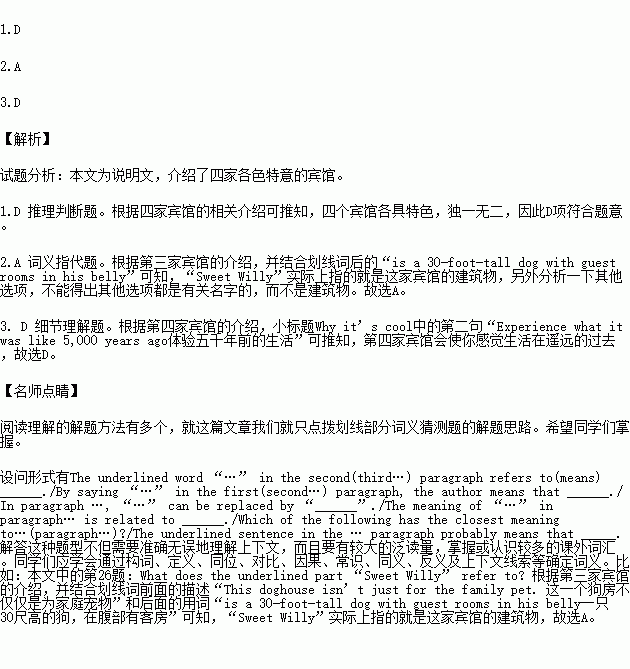题目内容
Tayka Hotel De Sal
Where: Tahua, Bolivia
How much: About $95 a night
Why it’s cool: You’ve stayed at hotels made of brick or wood, but salt? That’s something few can claim. Tayka Hotel de Sal is made totally of salt—including the beds (though you’ll sleep on regular mattresses (床垫) and blankets).The hotel sits on the Salar de Uyuni, a prehistoric dried-up lake that’s the world’s biggest salt flat. Builders use the salt from the 4,633-square-mile flat to make the bricks, and glue them together with a paste of wet salt that hardens when it dries. When rain starts to dissolve the hotel, the owners just mix up more salt paste to strengthen the bricks.
Green Magic Nature Resort
Where: Vythiri, India
How much: About $240 a night
Why it’s cool: Ridding a pulley(滑轮)-operated lift 86 feet to your treetop room is just the start of your adventure. As you look out of your open window—there is no glass!—you watch monkeys and birds in the rain forest canopy. Later you might test your fear of heights by crossing the handmade rope bridge to the main part of the hotel, or just sit on your bamboo bed and read. You don’t even have to come down for breakfast—the hotel will send it up on the pulley-drawn “elevator”.
Dog Bark Park Inn B&B
Where: Cottonwood, Idaho
How much: $92 a night
Why it’s cool: This doghouse isn’t just for the family pet. Sweet Willy is a 30-foot-tall dog with guest rooms in his belly. Climb the wooden stairs beside his hind leg to enter the door in his side. You can relax in the main bedroom, go up a few steps of the loft in Willy’s head, or hang out inside his nose. Although you have a full private bathroom in your quarters, there is also a toilet in the 12-foot-tall fire hydrant outside.
Gamirasu Cave Hotel
Where: Ayvali, Turkey
How much: Between $130 and $475 a night.
Why it’s cool: This is caveman cool! Experience what it was like 5,000 years ago, when people lived in these mountain caves formed by volcanic ash. But your stay will be much more modern. Bathrooms and electricity provide what you expect from a modern hotel, and the white volcanic ash, called tufa, keeps the rooms cool, about 65℉in summer.(Don’t worry—there is heat in winter.)
1.What is the similarity of the four hotels?
A. Being expensive. B. Being beautiful.
C. Being natural. D. Being unique.
2.What does the underlined part “Sweet Willy” refer to?
A. The building of Dog Bark Park Inn B&B.
B. The name of a pet dog of the hotel owner.
C. The name of the hotel.
D. The name of the hotel owner.
3.Which of the hotel makes you have a feeling of living in the far past?
A. Tayka Hotel De Sal
B. Green Magic Nature Resort
C. Dog Bark Park Inn B&B
D. Gamirasu Cave Hotel
 阅读快车系列答案
阅读快车系列答案
